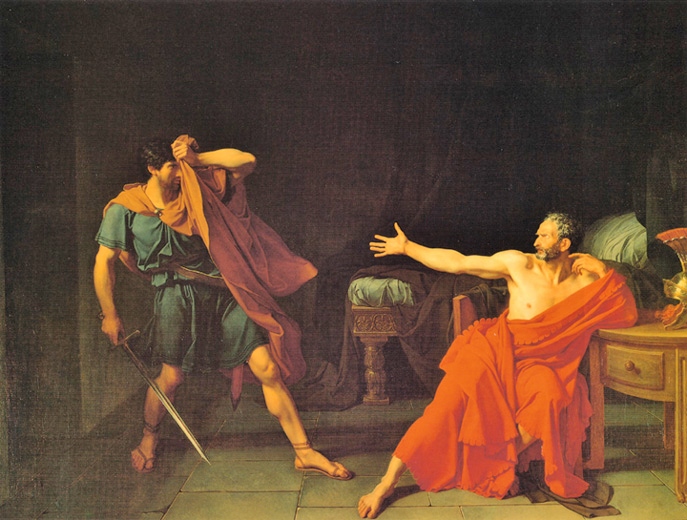There is little doubt that Augustus himself found the idea of being worshipped as a god as repellent and absurd,
毫無疑問奧古斯都發(fā)現(xiàn)了被當(dāng)做神來崇拜的荒謬,
but if it would help Augustus maintain the Principate and maintain the Pax Romano,
但是這可以幫助奧古斯都保持元首地位,羅馬和平,
peace over the Roman world,
羅馬帝國的和平,
Augustus considered his duty to play along.
奧古斯都決定順從這種崇拜。
In segment 11d the twelve Caesars
11章D 奧古斯都的繼任者

we meet Augustus' successors some were good, some were better than good and some were genuinely awful.
羅馬12帝王中有些是不錯(cuò),有些要好一點(diǎn),有些真的很糟糕。
Although the system of the Principate solved the Roman Empire's greatest problems
盡管元首統(tǒng)治的體制解決了羅馬帝國的最大問題,
it did not provide for a smooth transition of power to a worthy successor.
但是它沒能保證政權(quán)平穩(wěn)過渡到值得信任的繼任者手中。
There is also the problem of how to remove an incompetent Princeps.
如何撤掉不稱職的元首也是個(gè)問題。
The solution usually involved the Princeps' bodyguard that is the Praetorian Guard.
這里就涉及到元首的守衛(wèi),也就是禁衛(wèi)軍。
The Praetorian guards provided a quick solution by murdering the Princeps
禁衛(wèi)軍提供了一個(gè)迅速的解決方案,就是殺死元首,
but in so doing they set a bad precedent,
但是這樣做就開啟了非常糟糕的先例,
which would be repeated over and over again.
以后這樣的事就會(huì)不斷發(fā)生。
The year of four emperors 68 to 69 AD was the only real breach in the Pax Romana
四帝之年 公元68至69年是羅馬帝國和平時(shí)期唯一的例外,
but it was more Nero's fault than the fault of the system of the Principate.
但是這是尼祿的錯(cuò)誤,而不是元首制的錯(cuò)誤。
At least it was quickly resolved and at least it resulted in the succession of a very capable emperor,
至少羅馬人迅速的解決了這件事,還好繼承皇位的是一位有能力的皇帝,
Vespasian, who ruled form 69 to 79 AD and who was able to restore the Roman world to its pre-Nero situation.
維斯帕先,他在公元69至79年統(tǒng)治羅馬,能夠使羅馬世界從之前尼祿的局面中恢復(fù)過來。
Segment 11b Augustus and the Principate
11章B 奧古斯都和元首統(tǒng)治
Young Gaius Octavius beat long odds to become Rome's second founder, Augustus Caesar, Octavian,
蓋烏斯·屋大維出人意料的成為了羅馬的第二任創(chuàng)始人,奧古斯都·凱撒,
as we will call him for the time being was a adopted at age 18 in Julius Caesar's will.
我們暫時(shí)稱他為屋大維 他18歲時(shí)被尤利烏斯·凱撒收養(yǎng)。
As Caesar's adopted son he now bore the name Gaius Julius Caesar Octavianus.
作為凱撒的養(yǎng)子蓋烏斯·尤利烏斯·凱撒·屋大維亞努斯。
Both Cicero and Mark Anthony looked at Octavian as just a kid with a famous name,
是他的新名字 西塞羅和馬克·安索尼覺得屋大維只是一個(gè)有著響亮名字的孩子,
someone to be used abused and then tossed aside.
被當(dāng)做孌童之后就會(huì)被拋棄。
They paid for their mistake with their lives.
但是后來他們?yōu)檫@個(gè)錯(cuò)誤的認(rèn)識(shí)付出了生命。
Unlike his adoptive father Octavian was not a military genius or even a soldier.
和養(yǎng)父不同的是屋大維不是軍事天才,甚至不是軍人。
He relied instead on his name but more than that on his political skill
相反他的名聲更多的來源于他的政治技能
and his right hand man the general Markus Agrippa.
和他的得力助手馬庫斯·亞基帕將軍。
Above all Octavian was guided by an extremely clear sense of Roman culture
總而言之 引導(dǎo)屋大維的是非常清晰的羅馬文化感,
unlike his adoptive father Julius Caesar he knew the Romans would never stand for rule by a king
這和養(yǎng)父尤利烏斯·凱撒不同,他知道羅馬人永遠(yuǎn)不會(huì)接受被國王統(tǒng)治
or by anyone suspected of wanting to be king.
或是任何有嫌疑要成為國王的人。
So instead he convinced the Roman world that he was merely a regular guy
因此相反他使羅馬世界相信他只是一個(gè)普通人,
who just happened to be in temporary charge of the government and the military.
碰巧在現(xiàn)階段掌管羅馬政府與軍隊(duì)。











